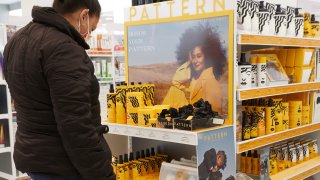
- Ulta Beauty said it will spend $50 million this year on diversity initiatives, including starting an accelerator program to support Black founders and putting money toward marketing their brands.
- Last year, the retailer more than doubled the number of Black-owned brands it carries from 13 to 28.
- As more retailers add Black-owned brands to their shelves, they must tackle new challenges: helping newer brands raise capital, gain name recognition and scale their businesses.
Ulta Beauty CEO Dave Kimbell said it is not enough for stores to put Black-owned brands on shelves.
Instead, he said, the retailer wants to make sure those brands gain a fan following and ultimately, have staying power.
"It's one thing to arrive on our shelves, but it's another thing to thrive," he said. "And that's what we want, every brand that we carry — and certainly BIPOC [Black, Indigenous and people of color] founded brands."
Get Tri-state area news and weather forecasts to your inbox. Sign up for NBC New York newsletters.
On Thursday, Ulta said it plans to spend $50 million on diversity and inclusion initiatives this year, including investments to ratchet up support for emerging brands. The company plans to start an accelerator program to mentor entrepreneurs of color, invest $5 million in a venture capital fund for their early stage companies and lean into marketing efforts to get their products in front of more consumers. That includes putting $3.5 million toward in-store merchandising, such as displays that grab shoppers' attention.
About $25 million of the annual spending will go toward company ads, social media campaigns and similar investments to reach beauty consumers of diverse backgrounds. Ulta plans to spend an additional $8.5 million on ads and marketing for Black-owned, led or founded brands.
Ulta is one of many retailers that have stepped up efforts to better reflect the country's diversity with the products carried, employees recruited and promoted, and even models featured in advertising campaigns. Along with its competitor, Sephora, it is one of more than 28 companies that signed the Fifteen Percent Pledge, an initiative that aims to make Black-owned products on store shelves proportional to the country's Black population. It is overseen by a nonprofit group with the same name.
Money Report
Yet retailers' aspirations to add more Black-founded brands to their shelves brings new challenges. Many of those companies are still new, with little access to capital and little or no name recognition.
LaToya Williams-Belfort, executive director of the Fifteen Percent Pledge, said supporting founders is the crucial step for retailers as they expand the number of Black-owned brands on their shelves. She said the nonprofit stresses the importance of not just flooding shelves, but making sure start-ups have a firm foundation as they grow, including access to marketing dollars.
If retailers give founders a shot — but without any other resources and tools — she said they set up companies for failure and "seed and create a narrative that says 'Black businesses can't be successful.'"
"What the industry will see is Black products don't sell, Black entrepreneurs aren't successful," she said. "Now, you revert right back to the ideologies and systems that we know were all race-based and biased, but you use this supposed proof of concept, which wasn't done the right way."
Ulta is building on its previous diversity investments. Last year, the retailer more than doubled the number of Black-owned brands it carries from 13 to 28. The company said it is roughly halfway toward reaching its goal of 15% representation on shelves.
Other retailers have kicked off their own efforts to support young brands. Sephora, Target and Amazon are among the companies with accelerator programs dedicated toward helping early stage start-ups led by entrepreneurs of color to develop, test and scale products.
Ulta's Kimbell said the addition of newer and innovative brands from Black founders is helping the retailer win customers and deepen shopper loyalty.
"These programs aren't off to the side, like just a nice 'to do' of our strategy" he said. "This is central to our success."
He said companies must acknowledge and tackle the unique barriers Black founders face — including a long history of getting less venture capital. He said the retailer's merchandising team works closely with founders to identify roadblocks.
Ron Robinson has experienced growing pains firsthand as founder and CEO of BeautyStat, which debuted at Ulta's stores and on its website this week. His brand, which includes a Vitamin C serum, is carried by Macy's-owned Bluemercury, Neiman Marcus and Nordstrom.
Before founding the company in 2019, Robinson was a cosmetics chemist for well-recognized beauty brands like Clinique and Estee Lauder. He said retailers can play a role in helping the emerging Black-owned brands of today become tomorrow's heavy hitters.
Retailers' small moves can make a huge difference, he said. Tossing samples into shoppers' bags. Expediting shipments to overcome supply chain snafus. Paying for products quickly rather than making a cash-strapped start-up wait for two or three months.
He said BeautyStat has gotten a boost from its retailers: It saw a near instant sales lift when Bluemercury featured one of its products in a targeted email to customers.
Robinson said he wants to see more retailers "become part of the brand-building process."
"It's a win-win situation," he said. "The retailer needs strong brands that are going to bring the consumers into the doors and buy those products and I think real magic could happen with those two working together."






